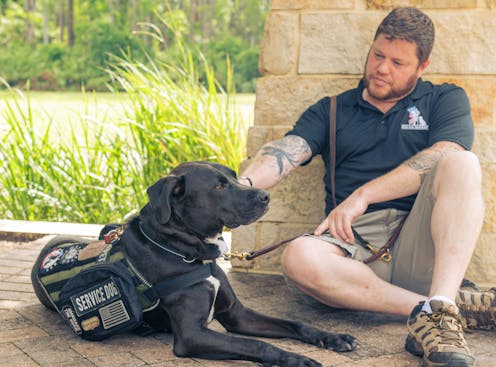Service dogs can reduce the severity of PTSD for veterans – new research
- Written by Sarah Leighton, PhD Candidate in Social Psychology, University of Arizona

Service dogs can alleviate some symptoms of post-traumatic stress disorder for veterans, according to a study our team published in June 2024[1] in the medical journal JAMA Network Open.
Over the past decade, our research group[2] has been studying whether trained service dogs can help veterans with PTSD[3] – a mental health condition that some people develop after experiencing a traumatic event[4].
Building off our preliminary findings[5], we conducted the first and largest clinical trial of its kind[6] to assess this complementary intervention.
We recruited 156 post-9/11 veterans from the waitlist of K9s For Warriors[7], a nonprofit that matches trained service dogs with veterans who have PTSD. Of that total, 81 received service dogs and 75 remained on the waitlist throughout the three-month study. Most had been deployed and had served in the Army, three-quarters identified as male, and the average age was 38 years old.
All veterans initially completed online surveys about their well-being and were interviewed about their PTSD symptoms by expert clinicians. We followed up three months after they either got a service dog or remained on the waitlist.
Those with service dogs had less severe symptoms and better quality of life. For example, they had milder depression and anxiety and better moods. They also had significantly lower odds of still meeting the diagnostic criteria for PTSD[8].
These results provide the most definitive evidence to date that service dogs are more than just pets. Our findings suggest that partnerships with these trained animals can yield lifesaving benefits for current and former service members.
PTSD can make it hard for veterans to flourish.Why it matters
With more than 17 U.S. military veterans dying by suicide[9] daily, their mental health is a pressing concern. Up to 29% of post-9/11 veterans have been diagnosed with PTSD at some point[10]. Some treatments for PTSD[11] are available, such as exposure therapy and medications. But barriers to care, stigma, and high dropout[12] rates from treatment programs limit their effectiveness[13]; thus, there is a push to identify additional treatment options.
For example, there has been recent research[14] on the use of the drug MDMA[15], combined with psychotherapy, for PTSD. However, an Food and Drug Administration advisory panel voted in June 2024 against approving[16] the drug’s use as a PTSD treatment due to concerns about safety and the potential for abuse.
Service dogs are trained in specific tasks to help with a disability. For veterans with PTSD, a dog’s role could include interrupting a panic attack or laying across veterans’ laps to calm them. People with disabilities have a legal right to be accompanied by their service dogs[17] in public, whether they’re at a supermarket or a baseball game.
Our findings can inform policymakers, health clinicians and insurance companies on the value of service dogs for veterans with PTSD, potentially increasing funding for groups that train and place service dogs and shortening wait times.
What’s next
We’re conducting a randomized clinical trial[18] called the Service Dog and Veteran Experiences Study, or SERVES. It’s being done in collaboration with K9s For Warriors and Canine Companions[19], another nonprofit that trains and provides service dogs to veterans.
In this next study, we will have a randomized group of veterans receive a service dog early or remain on the waitlist as a control. We will follow those veterans for 12 months – rather than just three months – after they receive a service dog or not.
The SERVES study, in turn, will be followed by another randomized clinical trial funded by the Defense Department. It will investigate whether service dog partnerships can enhance the effectiveness[20] of prolonged exposure therapy[21], an existing gold standard treatment for PTSD.
References
- ^ study our team published in June 2024 (doi.org)
- ^ our research group (www.humananimalinteraction.org)
- ^ PTSD (www.ptsd.va.gov)
- ^ after experiencing a traumatic event (theconversation.com)
- ^ our preliminary findings (theconversation.com)
- ^ first and largest clinical trial of its kind (doi.org)
- ^ K9s For Warriors (k9sforwarriors.org)
- ^ diagnostic criteria for PTSD (www.ncbi.nlm.nih.gov)
- ^ more than 17 U.S. military veterans dying by suicide (www.mentalhealth.va.gov)
- ^ diagnosed with PTSD at some point (www.ptsd.va.gov)
- ^ Some treatments for PTSD (www.ptsd.va.gov)
- ^ high dropout (doi.org)
- ^ limit their effectiveness (www.psychologytoday.com)
- ^ there has been recent research (theconversation.com)
- ^ use of the drug MDMA (doi.org)
- ^ Food and Drug Administration advisory panel voted in June 2024 against approving (www.cnn.com)
- ^ legal right to be accompanied by their service dogs (www.ada.gov)
- ^ randomized clinical trial (clinicaltrials.gov)
- ^ Canine Companions (canine.org)
- ^ service dog partnerships can enhance the effectiveness (news.arizona.edu)
- ^ prolonged exposure therapy (www.apa.org)
Authors: Sarah Leighton, PhD Candidate in Social Psychology, University of Arizona

